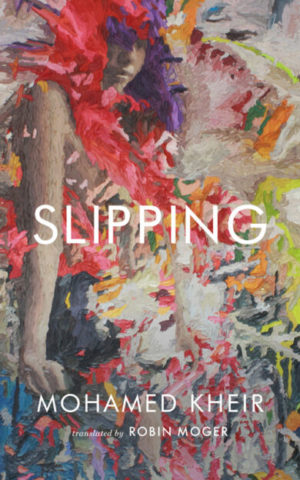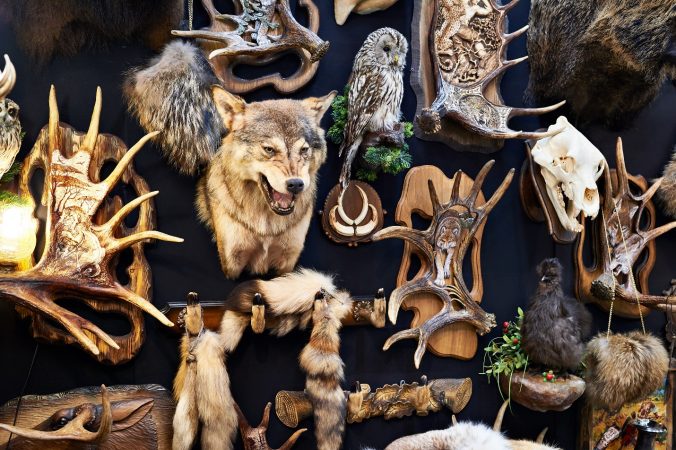You have no items in your cart. Want to get some nice things?
Go shopping
In Slipping by Mohammed Kheir, struggling journalist Seif is sent on a walking assignment through Egypt with an enigmatic companion named Bahr. An exile, Bahr has come back to his homeland to research material for a book, and Seif is picked to accompany him and write an article about their trip. Set after the Arab Spring uprising, this novel begins as a mystical journey and becomes much deeper, turning into an examination of both the fractured self and the psyche of a fractured nation.
Seif and Bahr are both dealing with their own grief, and this journey leads them to look inward and confront their own traumas. Intertwined with their expedition are the stories of other people who are either related to the places they visit or who have played an important part in their lives. A pivotal character is Ayla, Seif’s ex-girlfriend, who has an almost supernatural talent for singing sounds such as the gently lapping waves of the Nile, falling rain, or the crackle of a flame. Ayla also has the ability to feel when things are about to happen. She believes that she is connected directly to her distant ancestors; she is almost prehistoric in her relationship to the world around her, and she can see and feel things that others can’t. So she knows when it’s going to rain, but she also knows when things are about to turn bad – an inbuilt sense of danger that can be both saviour and enemy. What happens between Alya and Seif is directly responsible for Seif being on this journey, and his coming to terms with it over the course of their travels is far more important than his assignment for the magazine.
We also learn about Bahr as they walk and the reason for his exile. In some quite harrowing chapters, he details his early experiences of protest and suffering at the hands of the regime before he leaves Egypt and travels around Europe, sometimes living in refugee camps, sometimes in a succession of dingy rooms, taking part-time jobs, always with a packed bag sitting by the door and a nagging, insistent need to be ready to run. Eventually he falls in love and has a child, but it isn’t long before things go wrong and he has to leave again. Both of these men have loved deeply and lost painfully, and this pain is reflected in a nation trying to come to terms with the aftermath of the recent political storm.
Together the two men visit a number of out of the way, odd, or seemingly just impossible locations and people. For example, they visit an intersection of streetcar tracks where it’s possible to stand in a tiny safe spot as streetcars whistle past on both sides and even the slightest of movements would result in serious injury or death. Under a starlit sky, they appear to walk across the surface of the Nile when the tide is low enough for them to be able to walk on a raised section of riverbed. They visit an apartment block that is literally being rocked to its foundations by construction work next door, and there they meet a council inspector who has moved into the building because the vibrations provide a desperately-sought cure for his insomnia. We also take a walk in a rich, cosmopolitan neighbourhood where gigantic flowers with blade-like protrusions sprouting from their centres rain down onto unsuspecting pedestrians from the walls of a house perched high above them on a rocky outcrop. On the surface, these and the rest of the places they visit don’t appear to have much, if anything, in common. But the stories that Seif and Bahr tell each other as they travel, and the other people whose stories we hear and who are all, in some way, connected – no matter how loosely – bind them all together and create a patchwork from the fragments.
The world that most of us can’t quite see, the mysterious world that sits just at the periphery of our vision, is hugely important in this book, and so it’s not surprising that the story is filled with ghosts. The dead are everywhere, from the opening chapter to the closing one. They haunt Seif and Bahr on every step of their journey, and both were seeing ghosts before they met. Shortly after the protests, a traumatised Seif starts seeing the faces of dead people he once knew everywhere – at a café, in the metro station, driving a car, at the zoo. Of course, when he circles back to check on one of them, he finds that it isn’t his friend back from the dead and sitting outside the café, just someone who has the same build and posture. But each time he sees one of these faces it shakes him, and when he isn’t able to go back and check, he can’t be sure what he has and hasn’t seen. When he and Bahr visit “the wall of visions” in a temple carved into a rock, it is with the intention of seeing the dead; and that night, Seif sees them in his dreams. Ahmed, one of the devotees at the wall who watches over Seif and Bahr during their visit, saw his father’s ghost in his dreams when he was still living at home, and his mother, claiming to be almost possessed by it, gave their neighbours advice from her dead husband to the extent that they came to rely on it. After his mother has died, they turn to Ahmed to carry on telling them what to do, and it is on his, or rather his father’s advice, that the town makes a collective, life-changing decision.
Translated by Robin Moger, Slipping is a beautifully written work, lyrical and evocative. It is also intensely moving. Seif’s love for Alya shines from the page, and his joy at hearing her sing the sounds of the world around him is infectious. When tragedy hits, it’s so devastating that we feel the pain and the loss with him. Meanwhile, Bahr’s traumas seep into us, and we live his fear, humiliation, and anger. Mysterious and dreamlike in places, Slipping is also a beautiful lament to futures lost, both personal and political; and much like its ghosts and visions, it will continue to haunt you long after you have finished it.
Slipping
By Mohamed Kheir
Translated by Robin Moger
260 pages. Two Lines Press

About Jane Wright
Jane Wright is a web editor, writer and photographer. Her short fiction has been published by Litro, Sirens Call Publications, Crooked Cat, Mother's Milk Books and Popshot Magazine. She lives and works in Manchester.




